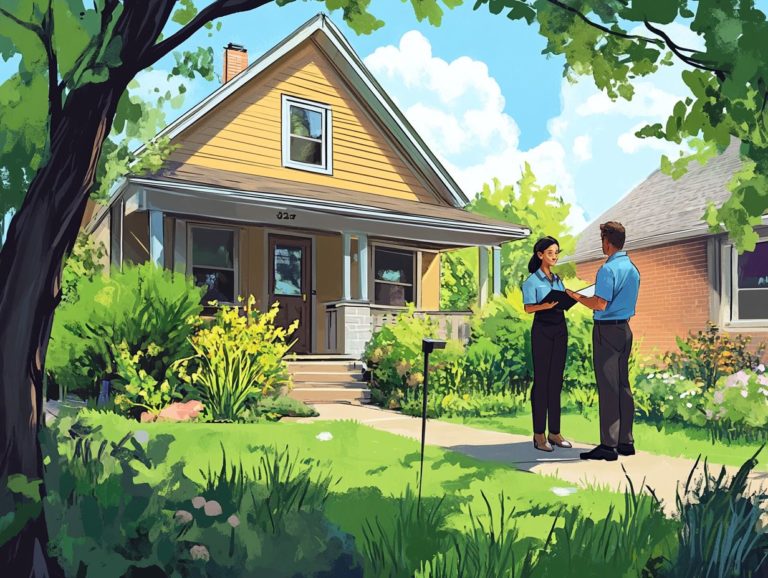Understanding the Basics of Home Insurance Policies
Home insurance serves as an essential safety net for homeowners, shielding one of life s most significant investments from unexpected events.
This guide clearly explains the essentials of home insurance, detailing its definition and purpose. It discusses the various types of coverage available to you and delves into the factors that influence insurance premiums.
Additionally, you will find practical tips designed to help you save on your premium costs. Whether you re stepping into homeownership for the first time or reassessing your existing policy, this comprehensive guide is tailored just for you.
Contents
- Key Takeaways:
- What is Home Insurance?
- Coverage Options
- Factors Affecting Home Insurance Premiums
- How to Choose the Right Home Insurance Policy
- Understanding Home Insurance Claims
- Tips for Lowering Home Insurance Premiums
- Frequently Asked Questions
- What is home insurance and why is it important?
- What does a basic home insurance policy cover?
- Are there different types of home insurance policies?
- How is the cost of home insurance determined?
- What is a deductible and how does it affect my home insurance policy?
- Are there any discounts available for home insurance?
Key Takeaways:

- Home insurance protects your home and possessions from unexpected disasters and accidents.
- Factors such as location, home value, and personal characteristics can impact the cost of your home insurance premium.
- Before choosing a policy, evaluate your coverage needs and compare quotes to find the right plan for you.
What is Home Insurance?
Home insurance, commonly known as homeowners insurance, is a vital financial tool that safeguards you against unexpected events that can lead to significant expenses.
This insurance gives you powerful protection against unexpected costs, covering not only the dwelling itself but also your personal belongings and liability.
Each homeowners insurance policy is carefully crafted to mitigate financial risks tied to property damage, personal liability claims, and any additional living expenses you might incur while repairs are underway. Understanding the claims process for home insurance is crucial to navigating these situations effectively.
Definition and Purpose
Homeowners insurance is a comprehensive policy designed to offer you financial protection against the risks associated with owning a home, including an understanding of the role of home insurance providers.
Think of it as an essential safety net, protecting you from unexpected expenses arising from property damage due to fires, storms, or theft. It also addresses potential liability claims that could emerge from accidents occurring on your property, ensuring your financial security.
Understanding the nuances of homeowners insurance is crucial, as it involves key elements like coverage amounts, which dictate how much protection you have for your dwelling and personal belongings. For a deeper insight, consider understanding the limits of home insurance types, which also includes deductible limits—the amount you pay out of pocket before insurance kicks in.
Grasping these aspects enables you to make informed decisions and effectively safeguard your investment.
Coverage Options
Homeowners insurance provides a range of coverage options tailored to meet the unique needs of property owners. This allows you to select the most suitable protection for your specific situation, ensuring peace of mind in safeguarding your valuable asset.
Types of Coverage and What They Protect
The types of coverage available in homeowners insurance typically include dwelling coverage, personal belongings protection, liability coverage, and additional living expenses. Each is designed to address specific risks that you may encounter as a homeowner.
Dwelling coverage is your safety net, protecting the structure of your home from threats like fire or severe storms. This ensures that you can rebuild or repair your property without overwhelming costs.
Personal belongings protection is equally essential; it shields your valuable possessions like electronics and furniture from theft or damage, allowing you to replace items without financial strain.
Liability coverage offers invaluable peace of mind. It covers medical expenses if someone is injured on your property, protecting you from potentially catastrophic lawsuits.
Additionally, understanding additional living expenses is vital. This coverage provides financial assistance for temporary housing if your home becomes uninhabitable due to covered damages. Knowing your policy limits and exclusions is essential to fully understand what is and isn’t covered.
Factors Affecting Home Insurance Premiums

Several key factors play a crucial role in determining your home insurance premiums. The location of your property, its overall value, and specific characteristics unique to you as a policyholder are assessed by insurance companies during their risk evaluation process.
Understanding these elements enables you to make informed decisions about your coverage.
We encourage you to review your insurance needs regularly or seek professional advice to ensure you have the right coverage in place.
Location, Home Value, and Personal Factors
The location of your home, its assessed value, and personal factors like claims history and deductible limits are key factors that affect your home insurance premiums.
Your geographic location significantly influences risk assessments. This is especially true if your home is in an area vulnerable to natural disasters such as hurricanes, floods, or earthquakes.
Insurers carefully evaluate the likelihood of these events occurring in your region. If you live in a high-risk zone, you might notice an increase in your premiums due to the elevated risk.
The value of your personal belongings also impacts your coverage amounts. If you own higher-value items, you may need additional coverage options or riders. However, there s also potential for discounts if those items are properly documented and secured.
Understanding these factors enables you to make informed choices about your insurance coverage. This ensures you re adequately protected without overspending.
How to Choose the Right Home Insurance Policy
Choosing the right home insurance policy requires careful attention. It’s important to evaluate your specific coverage needs and conduct a thorough comparison of various homeowners insurance options, including understanding the home insurance claims process to ensure you make an informed decision.
Also, take into account the requirements set forth by your mortgage company. This thoughtful approach helps you find a policy that protects your investment and aligns with your financial obligations.
Evaluating Coverage Needs and Comparing Quotes
Evaluating your coverage needs and comparing quotes from various insurance providers are crucial steps in selecting the most suitable home insurance policy for your unique circumstances.
To ensure adequate protection, assess the value of your personal belongings. Think about furniture, electronics, and prized collectibles that deserve special mention.
The property address plays a significant role in determining risk factors, such as susceptibility to natural disasters or local crime rates, which can ultimately influence your premium costs.
Don t overlook liability coverage! It protects you against potential claims arising from injuries on your property.
Engaging with insurance agents can provide valuable insights. They can clarify complexities and recommend coverage limits that suit your specific needs, ensuring you have peace of mind as you navigate this important decision.
Understanding Home Insurance Claims
Grasping the intricacies of the home insurance claims process is essential for you as a policyholder. Being well-prepared to file claims accurately and efficiently can streamline resolution with your insurance company, and understanding what every homeowner should know about insurance can further enhance your readiness.
Process of Filing a Claim and Common Issues

The process of filing a claim involves several key steps. These include documenting property damage, notifying your insurance company, and being aware of common issues that may arise during the claims process.
From the moment you identify damage, meticulous documentation becomes essential. This means taking clear photographs and compiling a detailed list of affected items, which can prove invaluable for substantiating your claim later.
Once you reach out to your insurance company, you ll likely encounter an adjuster who will assess the damage. It s crucial for you to provide as much information as possible.
Complications can arise, such as disagreements over coverage limits or the extent of the damage. This underscores the importance of reading policy details beforehand.
If you face denied claims due to fine print exclusions, understanding how to appeal this decision is vital for achieving a smoother resolution.
Tips for Lowering Home Insurance Premiums
You can effectively lower your home insurance premiums by employing a range of thoughtful strategies.
Consider taking advantage of available insurance discounts, maintaining your property diligently, and implementing security systems to mitigate risk.
Each of these steps enhances your home s safety and positions you for potential savings. Contact your insurance agent today to secure the best coverage for your home!
Strategies for Reducing Costs
Implementing effective strategies to reduce costs associated with homeowners insurance can lead to substantial savings on your premiums while still maintaining essential coverage.
Using different strategies can help you save more. For example, bundling your homeowners insurance with auto or other policies often unlocks impressive discounts.
Enhancing your security systems like installing smart alarms or security cameras demonstrates to insurers that you’re taking a proactive stance against risks. This can lead to lower rates.
Regular home maintenance, such as repairing leaks or updating your roofing, helps preserve your property’s value and reduces the likelihood of filing claims.
By focusing on these strategic measures, you can position yourself advantageously, lowering your premium costs while strengthening your overall insurance landscape.
Frequently Asked Questions
What is home insurance and why is it important?
Home insurance is a type of property insurance that provides financial protection to homeowners in the event of damage or loss to their home or its contents. It is important because it can help cover the costs of repairing or rebuilding your home, as well as replacing your personal belongings, in case of unexpected events such as fire, theft, or natural disasters. Understanding the claims process with home insurance providers can also ensure that you are adequately prepared when you need to file a claim.
What does a basic home insurance policy cover?
A basic home insurance policy typically covers damages to the physical structure of your home, as well as your personal belongings inside the home. For a deeper insight, check out understanding the differences in home insurance types. It may also provide protection if someone gets hurt on your property or if you accidentally cause damage to someone else’s property.
Are there different types of home insurance policies?
Yes, there are several types of home insurance policies available, including standard, broad, and comprehensive. These policies offer different levels of coverage and may have varying premiums. To make an informed choice, it’s crucial to understand the perils in home insurance types and choose the one that best fits your needs and budget.
How is the cost of home insurance determined?
The cost of home insurance is determined by several factors, such as the location and age of your home, its size and value, your credit score, and any additional coverage or riders you may choose to add on. Insurance companies also consider the likelihood of weather-related disasters in your area.
What is a deductible and how does it affect my home insurance policy?
A deductible is the amount of money you must pay out of pocket before your insurance coverage kicks in. Generally, the higher your deductible, the lower your premium will be. Choosing the right deductible can save you money make it count!
Are there any discounts available for home insurance?
Yes, many insurance companies offer discounts for things like having a security system, being a non-smoker, or bundling your home insurance with other policies. Be sure to ask your insurance provider about any potential discounts you may be eligible for to help lower your premium.






